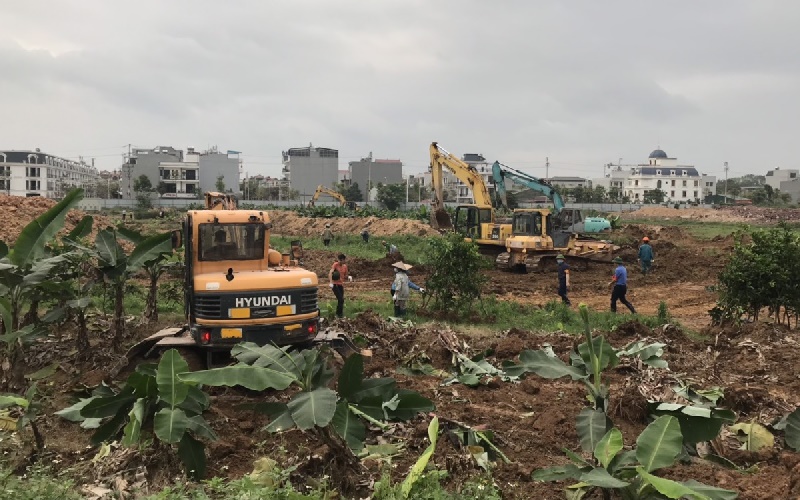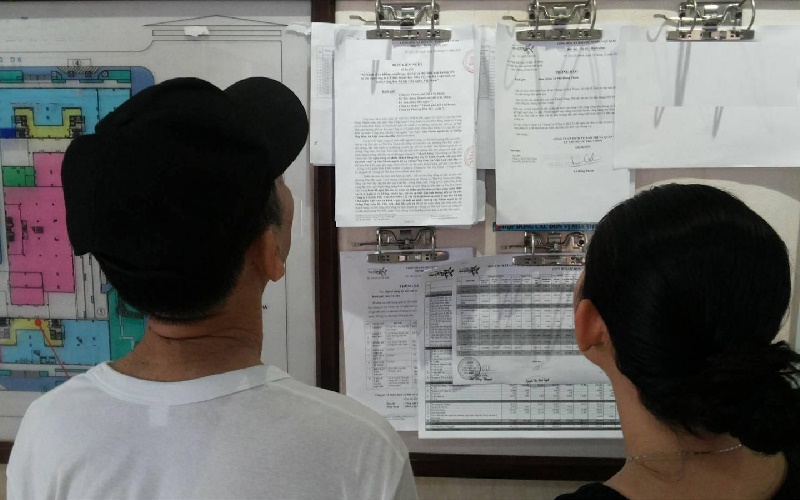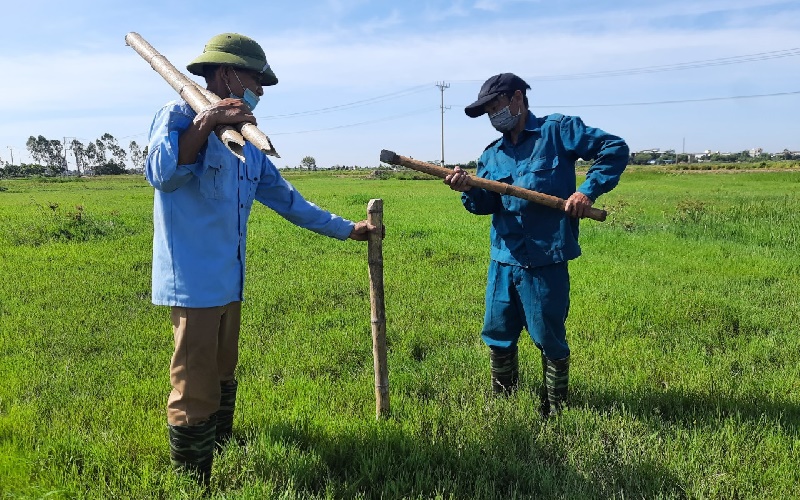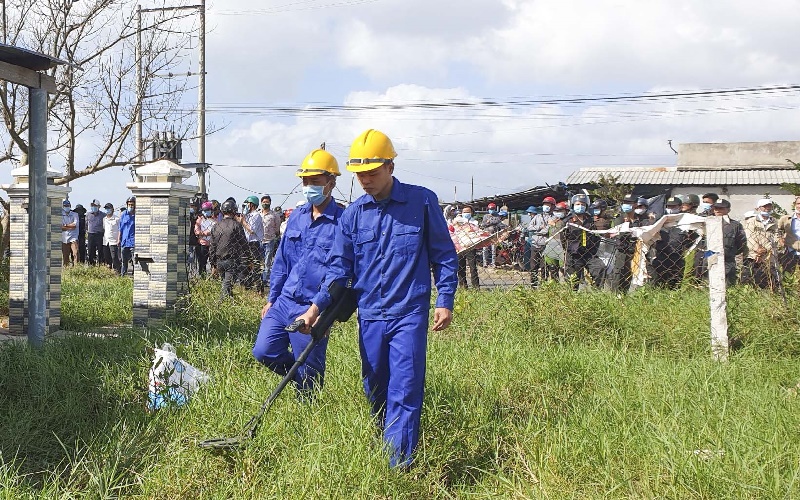Compulsory land reclamation by the State from individuals and households for socio-economic development, national security, and public interests is not a new concept.
However, some individuals and families deliberately occupy and refuse to relocate, forcing the State to enforce land retrieval in accordance with the law. This issue will be discussed further below.
1 Permissible Land Reclamation Cases According to the Land Law

According to the Land Law of 2013, issued by the National Assembly on November 29, 2013, the following cases are permissible for land retrieval:
Article 61: Land Reclamation for National Defense and Security Purposes includes the following specific cases:
– For military barracks and office headquarters;
– To build military bases;
– To construct national defense works, national defense and security fields and sites, and special defense and security constructions;
– To build military ports and stations;
– To construct industrial, scientific, cultural, and sports facilities serving national defense and security directly;
– To build warehouses for the people’s armed forces;
– For shooting ranges, training grounds, weapon testing grounds, and weapon destruction sites;
– To construct training centers, educational centers, hospitals, and sanatoriums for the people’s armed forces;
– To build official residences for the people’s armed forces;
– To construct detention centers and educational institutions managed by the Ministry of National Defense and the Ministry of Public Security.
Article 62: Land Reclamation for Socio-Economic Development and National and Public Interests includes the following specific cases:
– To implement important national projects with investment principles decided by the National Assembly that require land retrieval;
– To implement projects approved and decided by the Prime Minister that require land retrieval, including:
- Projects for constructing industrial parks, export processing zones, high-tech parks, economic zones, new urban areas, and projects invested with official development assistance (ODA) capital;
- Projects for constructing headquarters of state agencies, political organizations, socio-political organizations at the central level; headquarters of foreign organizations with diplomatic functions; historical and cultural relic sites, scenic spots, parks, squares, statues, memorial steles, and national-level public works;
- Projects for constructing national-level technical infrastructure, including transportation, irrigation, water supply, drainage, power supply, and telecommunications; systems for guiding, storing, and containing gasoline, oil, and gas; national reserve warehouses; and waste treatment works;
– To implement projects approved by the People’s Council at the provincial level that require land retrieval, including:
- Projects for constructing headquarters of state agencies, political organizations, and socio-political organizations; historical and cultural relic sites, scenic spots, parks, squares, statues, memorial steles, and local-level public works;
- Projects for constructing local technical infrastructure, including transportation, irrigation, water supply, drainage, power supply, telecommunications, and urban lighting; waste treatment works;
- Projects for constructing communal living facilities for the community; resettlement areas, student dormitories, social housing, and official residences; constructing religious establishments; cultural, sports, and entertainment facilities serving the public; markets; cemeteries, graveyards, funeral homes, and crematoriums;
- Projects for constructing new urban and rural residential areas; urban and rural area embellishment; industrial clusters; areas for concentrated production, processing of agricultural, forestry, aquatic, and marine products; and projects for developing protective forests and special-use forests;
- Projects for mineral exploitation permitted by competent authorities, except for cases of exploiting construction materials, peat, minerals in areas with scattered and small-scale minerals, and cases of exploiting residual minerals.
Article 64: Land Reclamation due to Violations of Land Laws includes the following cases:
– Using land for purposes other than those specified by the State for land allocation, lease, or recognition of land use rights, and having been administratively sanctioned for the act of using land for the wrong purposes but continuing to violate the regulations;
– Deliberate land destruction by the land user;
– Land allocation or lease to the wrong entity or beyond the authorized scope;
– Receiving land through transfer or donation contrary to the provisions of this Law;
– Land managed by the State being encroached upon;
– Land user neglecting their responsibility, resulting in land encroachment;
– Land user failing to fulfill obligations to the State and having been administratively sanctioned but not complying;
– Annual crop land not being used for 12 consecutive months; perennial crop land not being used for 18 consecutive months; and forest land not being used for 24 consecutive months;
– Land allocated, leased, or loaned by the State for project implementation not being used for 12 consecutive months or with a progress of land use slower than 24 months compared to the schedule specified in the investment project from the time of handing over the land on the ground for implementation.
If the investor fails to put the land into use, they will be granted a 24-month extension and must pay the State an amount corresponding to the land use fee or land rent for the period of slow progress in project implementation during this period.
Article 65: Land Reclamation due to Termination of Land Use according to the Law, Voluntary Return of Land, or Existence of Life-Threatening Hazards:
– Organizations allocated land by the State without land use levy, allocated land with land use levy but with the land use levy sourced from the state budget, leased land from the State with annual land rent payment, that are dissolved, bankrupt, relocated, or with reduced or no demand for land use; individuals leasing land from the State with annual land rent payment that are deceased without heirs;
– Individuals voluntarily returning the land;
– Land allocated or leased by the State with a time limit but not eligible for extension;
– Residential land in areas with environmental pollution posing life-threatening hazards;
– Residential land with the risk of landslides, subsidence, or other natural disasters threatening human life.
2 Principles of Enforcement for Land Reclamation Decisions

Enforcement of land reclamation decisions must adhere to the following principles: It should be conducted openly, democratically, objectively, and in accordance with the proper procedures and legal provisions. Notably, enforcement must be carried out during official hours.
3 Conditions for Enforcing Land Reclamation according to Legal Provisions

According to legal provisions, enforcing land reclamation must meet the following conditions:
In cases where the land owner refuses to comply with the land reclamation decision, despite persuasion and exhortation from agencies, organizations, and mass organizations such as the People’s Committee and the Fatherland Front Committee at the commune level.
When the decision to enforce land reclamation is publicly announced and posted at the headquarters of the People’s Committee at the commune level and some common living areas such as village headquarters, cultural houses, and ward/hamlet offices, where the land to be reclaimed is located.
The decision to enforce land reclamation has taken effect.
When the decision to enforce land reclamation takes effect and is handed over to the person subject to enforcement. If the person subject to enforcement deliberately refuses to accept the decision or intentionally absents themselves during the handover, the People’s Committee at the commune level must make a record of this.
4 Procedure for Enforcing Land Reclamation

The procedure for enforcing land reclamation is carried out in the following steps:
If the person subject to enforcement does not comply with the enforcement decision, the enforcement team will proceed with the enforcement.
If these persons do not relocate, the enforcement team will proceed to move them out of the reclaimed land. If, during the enforcement of land reclamation, the person subject to enforcement refuses to accept their assets, the enforcement team must make a record of this and hand over the assets to the People’s Committee at the commune level for safekeeping, notifying the asset owner.
The person subject to enforcement also has the right to file a complaint about the land retrieval and enforcement. However, the land retrieval and enforcement will still be carried out if there is no decision to resolve the complaint.
The above are comprehensive shares regarding the enforcement of agricultural land retrieval. Understanding the law will greatly benefit your life.
See also:






























